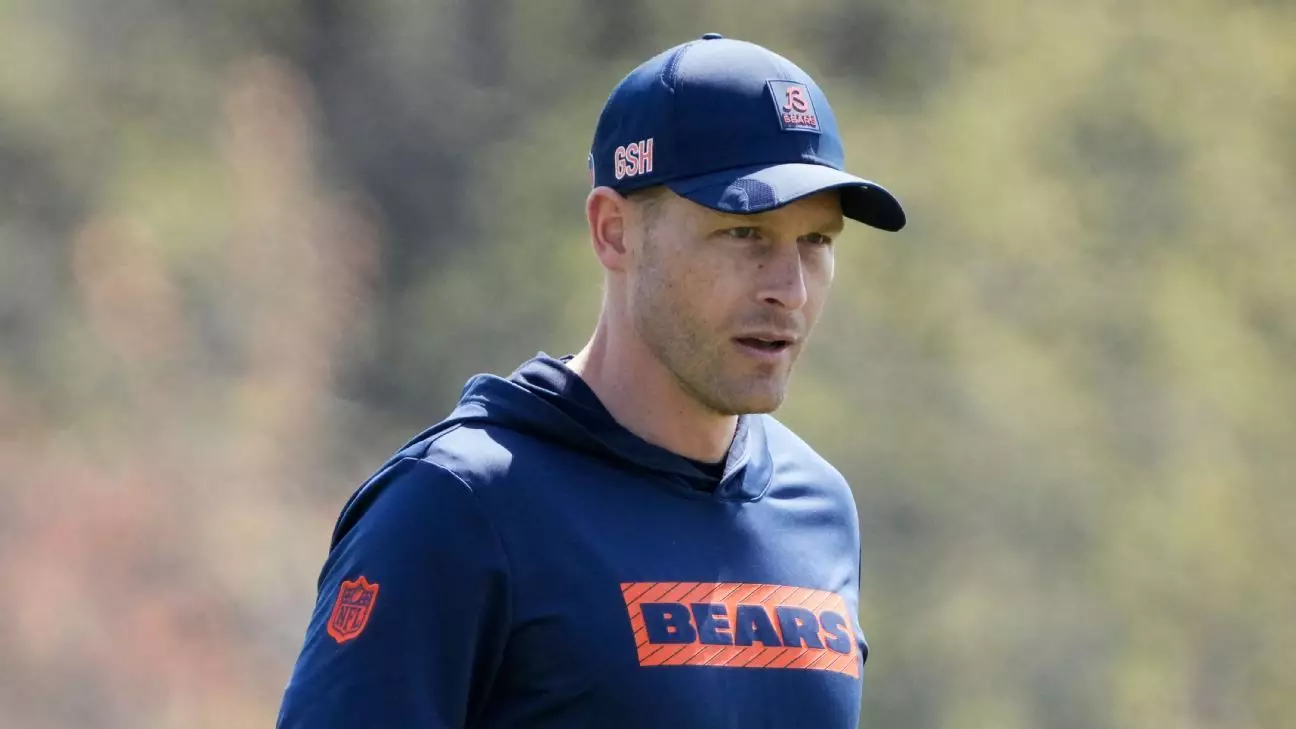In the heart of Lake Forest, Illinois, a seismic shift is underway within the Chicago Bears organization. Newly appointed head coach Ben Johnson is at the helm, and with him comes a palpable sense of optimism. He is not only aware of the franchise’s historical struggles in nurturing quarterback talent but sees this as a unique opportunity for transformation. Unlike his predecessors, who were often bogged down by the daunting legacy of past failures, Johnson is choosing to embrace these challenges with a mindset focused on positive change.
The quarterback position is pivotal in any football team, and the Bears’ history is littered with tales of unfulfilled potential and underperformance. Many fans and analysts often refer to a narrative suggesting that “quarterbacks go to die” in Chicago. This notable skepticism weighs heavily on the young arms that join the team, often creating an environment of fear and trepidation rather than one of growth and excitement. However, Johnson’s recent comments suggest he firmly believes that narratives can be rewritten. “I love it,” he stated in response to the daunting perceptions surrounding the franchise. His resolve to change this storyline is both invigorating and essential for the team’s future success.
Caleb Williams: A New Hope
Central to Johnson’s vision for transformation is the recent first overall draft pick, Caleb Williams. The quarterback’s tumultuous rookie season has already captured attention, especially with varied perspectives on his future with the Bears as depicted in Seth Wickersham’s acclaimed new book, “American Kings: A Biography of the Quarterback.” The complicated dynamic between Williams and the Bears has drawn interest from both fans and commentators alike. It was revealed that Williams and his father, Carl, harbored reservations about the Bears’ ineffectiveness in fostering quarterback talent. In a candid moment, Carl Williams voiced his concerns, suggesting his son would be better off elsewhere, even expressing a preference for the Minnesota Vikings.
An assertion like this could easily cripple a young athlete’s outlook, but one must consider how a supportive coach could alter that trajectory. Johnson has reportedly reached out to Williams following these revelations, underscoring his commitment to establishing a productive and empowering relationship. By treating Williams as an individual with distinct needs and not merely as a cog in the franchise’s wheel, Johnson hopes to break the cycle of disappointment. In the world of sports, personal rapport between coach and player can become a catalyst for remarkable growth.
Breaking Communication Barriers
Furthermore, Wickersham’s reporting unveils a critical rift that existed last season between Williams and then-offensive coordinator Shane Waldron. The isolation of a rookie quarterback who is left to analyze game film in solitude is disheartening and can often lead to stagnation. Williams’ pleas for accountability and more rigorous coaching demonstrate a young man eager to develop, yet starved for guidance. As Johnson assumes his intelligence-driven position as the offensive strategist, he recognizes that simply installing X’s and O’s is insufficient. Building a culture of open dialogue and constructive feedback will take center stage.
For any young quarterback, having that open line of communication with coaches can dramatically influence their developmental trajectory. Johnson points out the importance of forging trust over time. This principle isn’t merely a cliché; it’s a foundational element that can determine the success or failure of both a player and his coach. The shared goal is undoubtedly mutual: Williams desires to shine on the field, while Johnson aims to restore confidence and establish a winning culture within the locker room.
The Road Ahead
While the Bears’ dismal season record of 5-12 in 2024 may loom large in the shadows, it also holds the promise of a clean slate. Johnson’s assertive stance indicates he isn’t just seeking to address the consequences—the losses and the negative press—but is fully committed to exploring the underlying causes of these failures. His methodical approach to rebuilding starts with the player himself, acknowledging that success doesn’t solely originate from tactical play; it also requires a constructive environment.
The Bears fan base is ever-hungry for a return to glory, and with Ben Johnson steering the ship, hope reigns eternal. If he can successfully shift both the internal culture and the external narrative surrounding quarterback development, perhaps this ambitious venture will indeed become a remarkable chapter in the history of the Chicago Bears. As Johnson looks toward the future, the question remains: Will he and Williams pen a narrative of redemption and success among the storied failures of the past? The groundwork has been laid; the ball is now in their court.


Leave a Reply